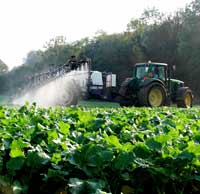Biscaya autumn use warning for oilseed rape growers

Oilseed rape growers are being warned against the use of neonicotinoid insecticide Biscaya (thiacloprid) to control aphids this autumn.
Biscaya is approved for the control of pollen beetle at the green bud stage – but not aphids in the preceding autumn, as some advisors have been suggesting.
Steve Foster, Rothamsted Research’s insecticide resistance specialist, said most rape crops are grown from seed protected by a second generation neonicotinoid seed treatment, such as Modesto (clothianidin + beta-cyfluthrin) or Cruiser OSR (thiamethoxam + fludioxonil + metalaxyl).
Therefore, for resistance management, a product with a different mode of action must be used for the first foliar spray.
“Applying another neonicotinoid at this point would favour selection pressure and that’s why it’s ruled out,” Dr Foster explained.
Broom’s Barn’s Mark Stevens reminded growers that the single Biscaya application permitted per crop should be saved for pollen beetle control, especially in the south and east where there is a high risk of the pest developing pyrethroid resistance.
For aphicide sprays on oilseed rape crops this autumn, he advised growers to consider drilling date and peach-potato aphid numbers.
“Typically, the second generation neonicotinoid seed treatments persist for up to two months from drilling so protection of crops drilled in the second half of August will be running out of steam around now,” he said.
Based on the low number of aphids currently being found in oilseed rape crops, Dr Stevens doubted much follow-up aphicide spraying will be needed this autumn.
But he advised growers to continue monitoring crops into November and make decisions based on individual findings.
“If a treatment is needed, pyrethroids are currently the only real option,” he said.
In Rothamsted’s monitoring of aphid resistance, knockdown resistance (kdr) to pyrethroids has only been found in about 20% of this year’s peach-potato aphid samples.
Dr Stevens said pyrethroids should therefore be reasonably effective and also control any cabbage stem flea beetle present.
“With MACE resistance now close to 100%, primicarb will be ineffective for aphid control and should not be used,” he added.

